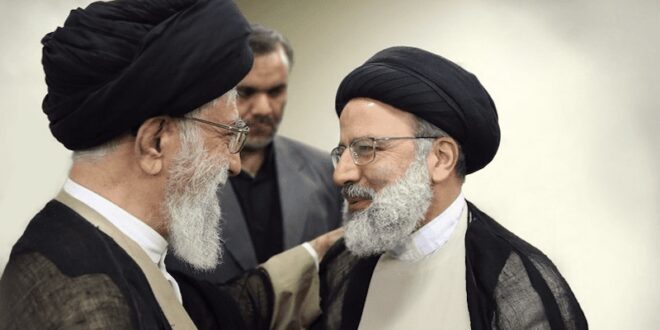The sudden death of Ebrahim Raisi, the Iranian regime’s president, in a suspicious helicopter crash will disrupt the constructed succession plan for the Supreme Leader of Iran, Ayatollah Ali Khamenei. This disruption will not necessarily favor Khamenei’s son Mojtaba Khamenei, as many might assume, but will instead create opportunities for Khamenei’s adversaries, specifically the Reformists/Moderates and certain factions within the Islamic Revolutionary Guard Corps (IRGC), to influence or steer the succession process.
How Khamenei rose to power in Iran
Succession has occurred only once in the history of the Islamic Republic. Ayatollah Ruhollah Khomeini (1900–1989), the first Supreme Leader of Iran, did not settle the issue of his succession while still alive for several reasons. First, as the supreme spiritual leader, he deemed it beneath himself to engage in a matter that would appear as political factionalism. Second, for a long time, nearly everyone accepted Ayatollah Hossein-Ali Montazeri, a prominent cleric, as Khomeini’s de facto successor. Third, towards the end of his life, Khomeini suffered from rapidly worsening cancer, which likely cut short any last-minute plans.
A close-knit group of three — Ahmad Khomeini, the supreme leader’s son and confidant, Khamenei the president, and Akbar Hashemi Rafsanjani, the speaker of parliament — took charge of managing the succession issue. They plotted to rule together in a power-sharing arrangement, with Khamenei at the helm as leader, Rafsanjani as president and Ahmad carrying the torch of his father’s legacy. However, the trio eventually fractured, and in a real-life cloak-and-dagger drama filled with hidden agendas and maneuvering, Khamenei outsmarted and eliminated his rivals, solidifying his position as the supreme and unchallenged leader.
Raisi’s rise and fall reflects Khamenei’s strategic planning
Khamenei has long tried to prevent his progeny and legacy from suffering the same fate that befell his predecessor’s. To achieve this, he purged potential disruptors and handpicked loyalists years in advance to ensure a smooth succession.
Raisi’s rise from obscurity wasn’t about him becoming Supreme Leader. The establishment positioned him, not to succeed Khamenei specifically, but to guarantee the continuation of Khamenei’s ideology, regardless of the next leader. Charisma wasn’t Raisi’s strong suit; in fact, he was utterly bland. But what he lacked in personality, he made up for tenfold in devotion to the regime and Khamenei. Therefore, if Mojtaba were to be groomed for leadership, Raisi would serve as his facilitator, not his competitor.
The death of Raisi disrupted Khamenei’s plan. Speculation abounds as to who benefits from this, but those subjected to rounds of purges and consigned to the regime’s margins are the most likely candidates, namely the so-called Reformists/Moderates and the disaffected parts of the IRGC.
In the first decade after the 1979 revolution, the future Reformists were among Ayatollah Khomeini’s closest allies. They even called themselves the “Line of the Imam” in his honor. However, Ali Khamenei and his faction sidelined them starting in 1989. Their influence further diminished after the suspicious death of Hashemi Rafsanjani in 2017. Out of power, they pragmatically adopted the label “Reformist” and began to rebuild relations with the West.
Decades of exile haven’t dimmed the ambitions of Iranian Reformists/Moderates. Based in Europe and North America, they haven’t given up hope. They dream of replacing Khamenei with Western backing and transforming the Islamist regime into a “moderate” version of itself. These figures remain active and any hiccups in Khamenei’s succession plan could be their golden opportunity.
Within the Revolutionary Guards exists a shadowy contingent I call the Shadow Guards. Not all Guards are Khamenei loyalists. Some commanders have even challenged his authority or shown disapproval. These dissenters, if not eliminated, now operate on the regime’s fringes. Khamenei further disrupts potential power grabs by rotating commanders. This creates an amorphous entity within the IRGC. Their loyalty isn’t necessarily to Khamenei, but to the regime’s core ideology. However, they see an opportunity to gain power when the leadership changes, and have reportedly begun making connections with former adversaries overseas.
The Reformists/Moderates and the Shadow Guards are finding common ground as the Iranian regime weakens. Both sides aim to preserve Iran as an authoritarian oligarchy, albeit through different tactics. The Reformists/Moderates cloak themselves in a liberal/leftist mask, while the Shadow Guards embrace ultranationalism. They both wield extensive media influence and strong lobbying power in the West. Their strategy is to co-opt elements of the monarchist opposition and establish a new elite to secure their control.
Iran’s authoritarian grip endures
Post-Khamenei Iran will see Islam remain the foundation of the regime, with nationalism acting as a façade masking its Islamist core. Already, some monarchists advocate for Iran to revert from Alavid Shiism with revolutionary clerical rule to Safavid Shiism, where a Shah presides over a Shiite establishment. This regime will continue to exclude most people and parties from political participation. Followers of minority religions can expect continued poor treatment, if not outright persecution. The regime’s foreign policy and relationships with its neighbors and the West will remain a mystery in a box.
The democratic world must be on high alert. To derail Khamenei’s criminal plans is undeniably attractive, but we cannot lose sight of the regime’s systemic corruption. Simply removing the top leadership won’t halt the tide of radicalism overflowing from Iran. It’s a trap — just like replacing communists with nationalist remnants of the Soviet regime didn’t solve its problems. Only a transition to a liberal democracy can normalize Iran and prevent future threats to its own people, its neighbors, and the global community.
 Eurasia Press & News
Eurasia Press & News




